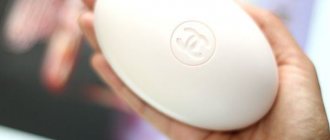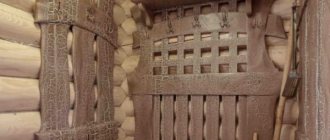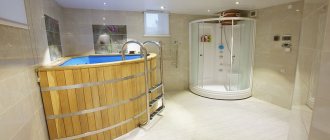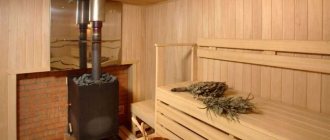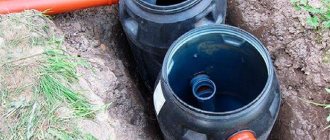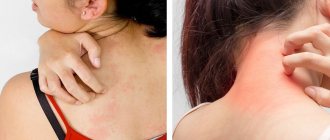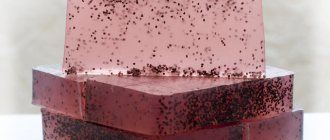Imagine how nice it is to find yourself in a wonderful Russian bathhouse after a week of work. Hot stove, birch broom, fragrant soap. A trip to the bathhouse always relaxes, renews, and revives. Today we will talk about what is the best soap for a bath, how it differs from other types, and what effect it has.
A long time ago, even instead of soap, people used sand and ash. The history of soap making begins 5 thousand years ago. The ancient Egyptians began to use a solution containing beeswax for washing. Essential oils and aromatic herbs were added there, thus obtaining real toilet soap, which was liquid.
Solid soap appeared several centuries later. In the 13th century it was available only to the richest and noblest segments of the population. Soap makers did not communicate with other artisans and were considered the highest class. It wasn't until the 17th century in Europe that soap became available to everyone. In 1662, the first patent for making soap was issued in England.
Modern soap is obtained from the interaction of fatty acids, esters and alkalis. The result is a homogeneous mass that thickens.
Animal fats and fat substitutes (synthetic fatty acids, rosin) are used as raw materials.
What kind of soap is there?
- Medical. Contains antimicrobial or medicinal additives. For example, antibacterial or to treat dandruff.
- Toilet. For frequent use. Consists of fatty acids and sodium salts.
- Bathhouse. Designed for washing well-warmed skin. Cleanses and nourishes well. Can be used to wash hair. Contains natural beneficial ingredients, such as herbal extracts, chaga, tar.
- Economic. Contains alkali, which removes most contaminants, and an antiseptic for an antimicrobial effect.
Stages of bath soap production.
Saponification. Interaction at high temperatures between fat and alkali (sodium hydroxide). The result is a glue-like mass that quickly hardens when cooled. Consists mainly of glycerin and unrefined soap.
Relaxation. Treating the soap solution with a strong alkali, such as sodium chloride. As a result, a persistent substance is formed that has a harder consistency. It is better stored, does not go rancid and is easily transported.
Comparison with other products
Of course, Grandmother Agafya is far from the only one who thought of combining many extracts and creating such a universal remedy for the body. Natural black bath soap is a very common product on the market. Naturally, he has his own competitors who are trying to adopt the recipe, create a cheaper product, and lure potential buyers to themselves. Black bath soap has mostly positive reviews. Short annotations written by customers help to better navigate the range of products.
Composition of bath soap
Let's talk about our line, which contains only natural ingredients.
Herbal.
Herbal bath soap contains extracts of chamomile, sage, burdock, nettle, and aloe vera. Well soothes, reduces inflammation, relieves itching after insect bites. Nourishes and tones the skin. Suitable for washing body and hair. The hair becomes soft, easy to comb, and does not tangle.
Honey and rosemary.
The soap has a pleasant aroma, improves mood, and relaxes. Honey deeply nourishes and retains moisture, which helps smooth out wrinkles and rejuvenate. The skin becomes elastic and acquires an even tone. Rosemary soothes after an active day, cleanses pores well, making blackheads disappear. Extracts of burdock and nettle give healthy shine and elasticity to hair.
Birch and orange.
Birch and orange soap is suitable for any skin type. Birch cleanses the skin of impurities and sebum accumulated throughout the day, disinfects, and relieves inflammation. The feeling of freshness after washing remains throughout the day. Orange zest acts as a soft scrub and exfoliates dead skin. Vitamin C removes age spots and unevenness, the skin is renewed and acquires an even tone. Nettle and burdock strengthen and thicken hair and give a beautiful natural color.
The entire line of bath and shower soaps has a delicate, pleasant texture. Suitable for sensitive skin. The cost of funds is very profitable, which will allow you to use one jar for several months and save your budget.
Application
Great popular love for this soap arose precisely because of its versatility. A natural remedy, not intended for anything specifically, but applicable as any modern composition. It smells nice, has excellent consistency, and foams well. Great for hair and body. In addition, it can be used as:
- shower gel;
- hair shampoo;
- shaving foam;
- anti-dandruff products;
- foam for washing;
- makeup removers;
- hair growth and restoration product;
- and, of course, for its intended purpose.
The imagination of sophisticated buyers, of course, is enough to use grandmother Agafya’s black soap in different ways. The composition of the product is universal, the texture of the soap is pleasant, and the smell is unobtrusive. Many people associate the smell of herbs with a Russian bath, in which using one product instead of many different ones is much more convenient and practical.
Laundry soap
Soap was invented almost 200 years ago, and since then the composition has remained almost unchanged. Another name is “sodium soap”. During production, caustic soda is used as an alkali. The recipe complies with GOST. Soap is made from vegetable and animal fats (pork, fish, beef). Contains more alkalis and acids than bath and toilet products.
Has the following characteristics:
- brown tint - from dark to dull yellow - depends on the degree of purification,
- square bars of 180-200g with embossed numbers that show the fatty acid content (from 65% to 74%,
- rough surface.
Widely used in laundry, washing various surfaces, as a hand detergent when carrying out household work.
Effectively removes stains and whitens. It has an antimicrobial effect and prevents the development of fungal diseases. Among the disadvantages, one can note a specific smell; with prolonged use, it dries out the skin. Not recommended for sensitive and allergy-prone skin.
Question answer
At what age can black soap be used to wash children?
Thanks to its natural composition, black soap is suitable for washing children almost from birth. However, it is important to be careful, as the product can provoke the development of an allergic reaction on the skin.
Which is better: black soap in solid or gel form?
Both options are equally effective. When choosing a form, much depends on the preferences of the buyer himself. However, before purchasing, do not forget to carefully study the composition.
Can black soap be used for daily care?
It all depends on what purpose the soap will be used for. For example, as a daily care product, it can be used to wash your hands and body. To wash your hair and face, it is recommended to use the product no more than 2-3 times a week.
Is it possible to make face masks from black soap?
Yes, you can. However, such masks are not recommended for people with dry and very sensitive skin.
Can black soap be used after the expiration date?
No, using natural soap after the expiration date may not be safe for your health.
Toilet soap
Used for personal hygiene, suitable for any skin, gently cleanses and does not dry out.
The base consists of fatty acids and sodium salts. For additional skin care and aroma, it may contain herbal extracts and essential oils.
Main types:
- baby - does not contain artificial colors or flavors, only high-quality vegetable oils are used as a fat base,
- neutral - contains at least 78% fatty acids, high-quality rendered edible fats are used in production,
- extra - the hardest, has low swelling, therefore economical in consumption, carbonate content is no more than 0.2%, which indicates high quality,
- ordinary - softer in texture, the composition may include cheaper fragrances and dyes.
Let's talk more about tar soap, which is also a toilet soap. We receive many questions asking us to tell us when and how to use it correctly.
Our assortment includes liquid soap “Tar”, bottles of 500 and 1000 ml. In addition to caring, it has an antimicrobial effect, so it is indispensable for sensitive and problematic skin. Gently exfoliates dead scales, promotes cell and skin renewal and rejuvenation.
Eliminates symptoms of psoriasis, seborrheic dermatitis, clears acne, relieves itching.
Extracts of ginseng and aloe vera soothe, moisturize and nourish. The skin becomes soft and velvety to the touch.
Thanks to its liquid texture, it is very economical. To use, apply a small amount to the skin, lather and rinse thoroughly with warm running water. If soap gets on the mucous membranes of the eyes or nose, rinse with clean water until completely eliminated.
Natural Altai soap
In addition to the product made according to traditional Siberian recipes, you can purchase natural Altai black soap for the bath, which, in principle, has the same properties as the body product presented by Grandma Agafya. Altai soap is much inferior in the number of ingredients. It contains many more chemicals, including parabens. Altai soap includes only herbal extracts and several types of oils; infusions are not added to it. This soap may be suitable for a bath, but not for everyday cleansing.
Advantages
Nevertheless, black soap for baths also has its advantages. Summarizing all of the above, we can formulate several conclusions:
- the soap is created on the basis of natural ingredients;
- multifunctionality of the product;
- average price;
- large volume;
- positive consumer ratings.
over many years of existence on the market, it has established its products as high-quality, natural products that everyone can afford.
Bath soaps from “Rainbow Smile”
In addition to Grandma Agafya, other manufacturers also produce special bath soaps. So, in the Rainbow Smile stores you can purchase:
- White soap with cedar essential oils.
- Green soap based on juniper oil.
- Black soap based on eucalyptus oil and birch tar.
- Brown soap based on kvass soup.
- Orange soap based on orange oil.
The manufacturer claims that all these types of soaps - without any artificial fragrances, without parabens, gently and deeply cleanse the skin and have a powerful antioxidant effect.
How to make your own soap
This beauty makes me want to try it
Homemade bath soap is not only a natural and environmentally friendly product, but also an opportunity to bring your ideas and fantasies to life. The process of soap making is very addictive and often develops from a simple hobby into something more, bringing significant income to the family budget.
Required Ingredients
Beginner soap maker's kit
- The basis. White or transparent soap base is freely sold in specialized stores. You can also use ordinary baby soap as a basis (for those who are trying to make soap for the first time, it is better to use it);
Photo of transparent soap base
- Base oil - this can be absolutely any oil: peach, olive, apricot, depending on your preferences;
- Essential oil – here you need to clearly determine for what purpose the final result will be used. To try to get rid of cellulite, orange oil is ideal; tea oil will cleanse oily problem skin;
Professional soap makers have entire collections of essential oils
- Dyes – food or special. Here you can save money and use natural products: coffee, juice, chocolate, etc.;
- Other additives. They are introduced into the composition to give the soap a certain property. To make scrub soap, use oatmeal or ground coffee; for extra velvety skin after washing - honey or cream;
- Molds for pouring soap.
Advice! If you are new to soap making, use regular children's molds that are played in the sandbox, this way you will make your first experience cheaper. Well, if you start cooking seriously, it’s better to fork out for special forms that are more practical and varied in configuration.
- Water bath container;
- A decoction of medicinal herbs, warm milk or plain water for diluting the base;
- Alcohol or vodka for lubricating the surfaces of the molds;
- Fantasy.
Stages of work
The instructions for making soap are simple, however, in order for the final result to be satisfying, you need to carefully follow the technology.
- Soap base or a piece of baby soap is cut into small pieces or grated on a coarse grater;
- In a water bath, melt the resulting shavings or pieces, adding base oil at the rate of 3 teaspoons per 100 g;
- While the base is heating, add cream or milk (just a little) until a sour cream-like mass is obtained. You can replace the liquid with sugar, this will make the base melt better and faster;
Instead of milk, you can add water, but if you do it incorrectly, the base will separate.
- When the soap base is completely melted, it's time to add the ingredients:
- — essential oil – 5 drops;
- - glycerin - a teaspoon;
- - dyes, flavors - to taste, but within reasonable limits;
- - various additives - at the discretion of the creator (here there is an opportunity to fully satisfy your ambitions as an artist and perfumer combined);
- Pour the warm liquid soap into the mold. Be sure to spray the surface with alcohol (as a last resort) and vodka - this will eliminate the appearance of air bubbles;
- The soap cools and hardens for 2-3 days. To speed up the process, you can put it in the refrigerator;
- Carefully remove the bath soap from the mold and voila! it's ready to use!
Handmade bath soap
Products
There are quite a lot of black products in the product line. For example, a special facial soap with activated carbon, which effectively gets rid of blackheads. Siberika cedar body soap is similar in composition to grandma Agafya’s black soap. It is black in color, smells nice, but has a more liquid consistency.
The components in it, unlike other manufacturers, are selected specifically to solve specific problems. The company initially does not set itself the goal of making a “hodgepodge” of herbs; each component solves specific skin problems. The price of Siberika black soap is quite high (varies within 500 rubles). The downside of the product is that this product is intended exclusively for the body; for hair you will have to purchase a product from another line, which is no longer profitable.
African black soap
This solid soap is made exclusively from plant ingredients. The main components of the product are the ash of banana, palm, plantain, and cocoa bark leaves. And the binding component is vegetable oils: palm, coconut, olive, shea butter and so on...
In the production of African black soap there is no single standard; different components of plant components and different oils can be used.
The production technology is simple to perfection - the leaves and bark are burned. The resulting ash is the basis of future soap.
Cooled ash is added to the water, filtered, and oils are added to the filtered solution and stirred continuously throughout the day. The resulting mixture is infused for two to three weeks.
By adding certain components to the soap, manufacturers have improved production technology. Therefore, African black soap can be purchased in solid briquettes and in liquid form.
With the simplest production (adding oils to ash and aging), the soap turns out to have a viscous texture, like thick and dried Shrovetide clay.
